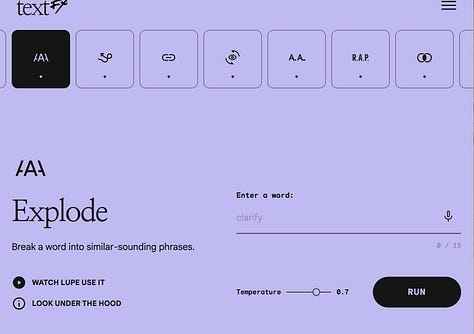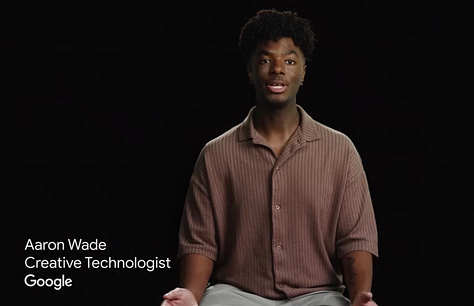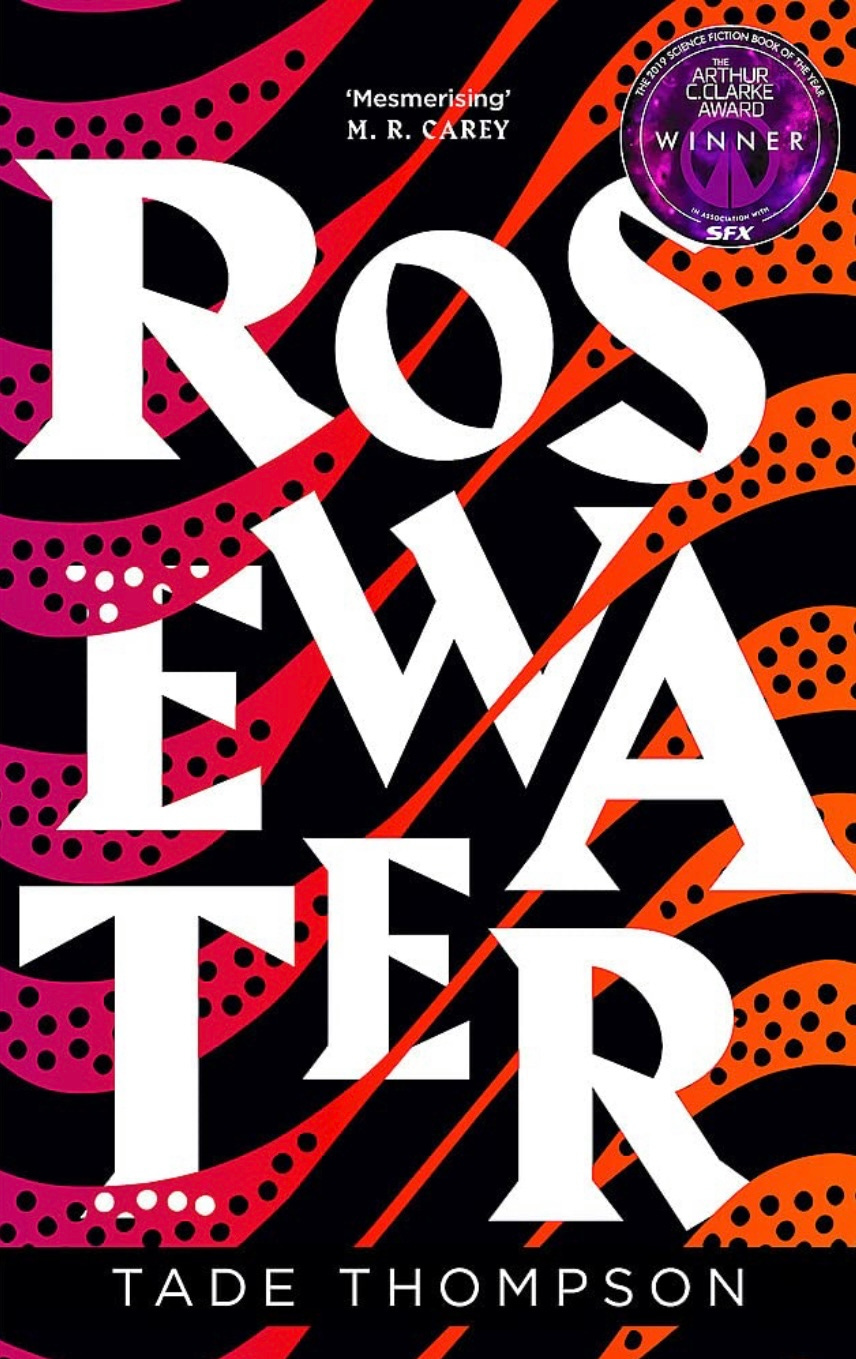Dear Reader
You will love this.
Rappers x AI
Google has worked with rapper Lupe Fiasco to create an AI word-exploring app called TextFX. It uses Google's gen AI (PaLM language model) to generate creative possibilities with text and language. There are 10 different tools designed to be playfully deployed in the writing process by rappers, writers and wordsmiths.
Creative technologist Aaron Wade from Google says, "Lupe didn't want an AI to write lyrics for him, but instead wanted a tool that helped him explore the universe of possibilities from any word or phrase." There's a "Chain" mode that links words into poetic phrases, and I had fun with the Acronym generator. The tech is similar to what's behind ChatGPT and Google Bard, but the thoughtful design makes it a very different experience. Overall it's a great example of using AI as a creative spark rather than replacement.






In “Chain” a mode that links a series of words that start to sometimes sound like the beginning of a poem: antonym, opposite, contrast, difference, distinction, line, border, fence…
I like using AI tools like this in a creative process: as a starting gun for the creative mind, or an instant shower of inspiration sparks - beautiful in itself and then something catches and you’re off…
Nobody knows anything Pt.734
The phrase “nobody knows anything” was coined by William Goldman to describe the movie business but is an equally useful mantra to keep muttering to yourself during a technology revolutions. The future of AI hasn’t been invented yet. No one, especially not the inventors and experts, know exactly what will happen.
This observation from Jeff Hawkins's A Thousand Brains illustrates how difficult it is to predict how technologies will be adopted and evolve in society:
When we create a new technology, we imagine that it will be used to replace or improve something we are familiar with. Over time, new uses arise that no one anticipated, and it is these unanticipated uses that typically become most important and transform society.
In 1992, Hawkins gave a talk to senior people at Intel, including co-founder Gordon Moore, he of Moore’s Law fame. He pitched a vision of the computing where everyone would be carrying small, powerful computers in their pockets and said Intel should focus on building microprocessors for this future. It didn’t go down well. People couldn’t imagine how and why he was right:
Everyone was seated at their lunch table and the food wasn't going to be served until I was finished, so I didn't expect to get many questions. I remember just one. A person stood and asked in what seemed like a slightly derisive tone, "What are people going to use these handheld computers for?" It was difficult to answer this question. At that time, personal computers were primarily used for word processing, spreadsheets, and databases. None of these applications were suitable for a handheld computer with a small screen and no keyboard. Logic told me that handheld computers would mostly be used for accessing information, not creating it, and that was the answer I gave. I said that accessing your calendar and address book would be the first applications, but I knew they were not sufficient to transform personal computing. I said we would discover new applications that would be more important.
No one in that 1990s room, despite all of them being at the cutting edge of computer technology, could imagine a world with iTunes, digital photos, and social networks. This may also be why even ten years later Kelly Rowlands was trying to write messages on a Nokia in a spreadsheet, during the video for her 2002 collab with Nelly…
Rather than making predictions, the best innovators focus on building tools that enable new possibilities to emerge. Hawkins says after that talk, he avoided "visionary" predictions and instead focused on making the future of mobile happen through invention.
The lesson is that we shouldn't get too locked into how we expect new technologies like AI to be adopted. The most world-changing applications are ones we haven’t thought of yet.
Phrase of the week: Technology overhang
The FT describes “tech overhang” as: “a period of time that industries will spend integrating the latest AI developments into products, even if research does not progress at all”. It quotes one of the ex-Google research scientists from the Transformer team, Vaswani:
You are seeing the aftermath — AI is drawing in researchers, technologists, builders and product folks. Now we believe there is a tech overhang . . . and there is a lot of value to be realised in various products. In some sense that is why we all dispersed and tried to put this technology directly in people’s hands.
“L’opportune c’est f***ing enorme.”
Pardon his French, as it were, but this made me smile.
A coach from Cork berates the La Rochelle rugby team for poor performance. He speaks fluent French, but does not give up one inch of his accent, and brings some English expletives to the party.
This week I’ve been…
Reading
Rosewater, by Tade Thompson. I’m re-reading this deeply weird Sci Fi tale, Rosewater, about an alien structure that a city has grown up around in a near-future Nigeria.It’s the first book of a trilogy which has recently been completed. I could remember sensations and moods from the book, I’d forgotten a lot of what actually happened so I’ve gone back in from the start. The prose is wonderful – evocative and laconic in a way, presenting extraordinary things – the said alien presence, the protagonist’s psychic abilities – in a way that makes them seem just ordinary, sometimes irritating parts of everyday life.
Watching
White Lotus, season two (Now TV).
They say you should read a good novel twice: the first time for the plot and the second time for the prose. Watching White Lotus season two this week was very much like that experience.
The first time we watched it the episodes came weekly, which was irritating. This time we paced it at one episode an evening – not a binge but a good pace, it turned out. Just like the first, there’s plenty of detail you may have missed on a first viewing, and you can enjoy the exquisite art direction and writing where you were too caught up in the suspense the first time round to give it much thought.
Listening
These Times
Tom McTague who co-hosts the These Times politics podcast with Helen Thompson, was interviewed by his editor from Unherd about the inner workings of the Tony Blair Institute. It’s fascinating:
[The Tony Blair Institute has] a revenue-generating consultancy arm, and then there's a kind of think-tank policy unit. And are they staffed separately? Do people move between them? I think they are seen as slightly separate. They're seen as complementary, in that you have... For any world leader, they need ideas and policies, and then they need to know how to implement them. This was a lesson that Tony Blair had learned himself in government, where he felt that actually he was only getting good at the job towards the end of his time, and that he didn't understand how to wield power to use the civil service to actually do things. And so that is one of his lessons. And so within the organisation, you have, yes, this business, almost, but the profits are then redirected within the organisation to offer consultancy pro bono to African governments that can't afford it.
[Insert video]
That’s all for this week…
Have a great rest of August – we’ll be back in September.
Antony







